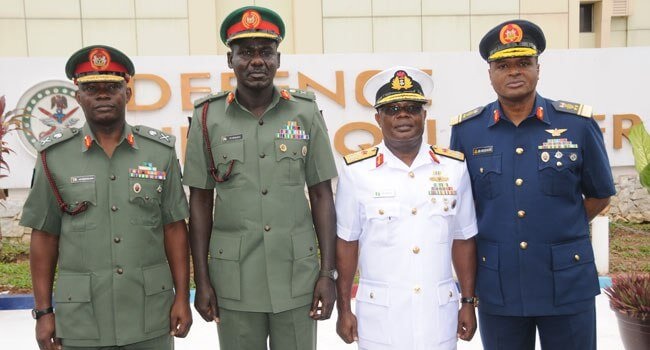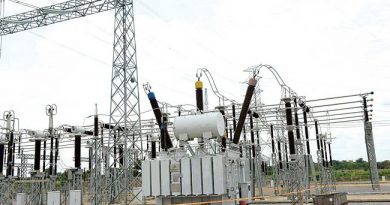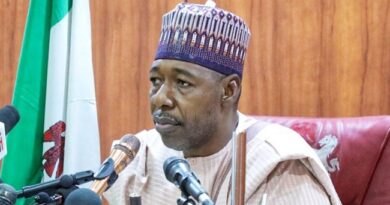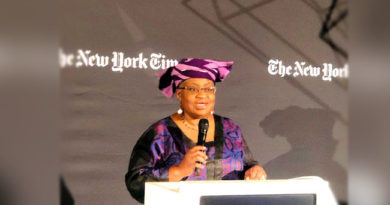Why Is Buhari Still Keeping The Service Chiefs?
There can be only one reason why President Muhammadu Buhari is still keeping the service chiefs. And that may be because he considers them extremely loyal to him or they had sworn to an oath of loyalty! Which leads logically to the conclusion that the President may be afraid of a coup!
As unreasonable as any thought of a military coup is, there doesn’t appear to be any plausible reason for Buhari to retain the service chiefs in contravention of Section 8 of the public service rules, which stipulates that the compulsory retirement age for all grades in the service shall be 60 years or 35 years of pensionable service whichever is earlier.
At the just concluded African Union Peace and Security Summit held in Addis Ababa, Ethiopia, Buhari called for a review of strategy in the fight against terrorism and insecurity in the continent, suggesting that many governments are not using the right approach.
But Buhari himself has been under intense criticism for failing to rejig his own country’s security structure to re-energize the war against insurgency.
Prominent groups and individuals in the country have called on the President to change the service chiefs to re-invigorate the fight against insurgency in view of the resurgence of Boko Haram attacks.
Nearly every prominent group and person in the country has called for the sack of the service chiefs, including former Emir of Gwandu, Buhari’s former ADC, Mustapha Jokolo who even stretched his call to include the chief of staff and the national security adviser. But Buhari has refused to bulge.
His aides have continued to bore us with ‘reasons’ why the President cannot retire them. The so-called reasons are not only ridiculous but laughable.
Garba Shehu told us the President, being a military general, knew what it takes to win a war and must have his reasons for keeping the service chiefs. But he didn’t say why the president had refused to let them go-meaning he too didn’t know, just like the rest of us.
Then when Boss Mustapha, the Secretary to the Government of the Federation (SGF) was asked a similar question by Journalists, he also rambled and rambled and got the journalists confused until he said, as if in anger: “You don’t sack people like that.
There are processes and I believe that at the opportune time, those processes will be followed. You don’t just wake up and say, sack people, it doesn’t happen like that”.
Bottom line again is that the SGF himself may have no idea of what he was talking about. Perhaps, only the chief of staff to the President, who we now know, the service chiefs report to, can tell Nigerians the reasons behind Buhari’s unending romance with the service chiefs. But he has yet to publicly address the issue.
The service chiefs are: Gabriel Olonisakin, chief of defence staff, Tukur Buratai, chief of army staff, Sadique Abubakar, chief of air staff, and Ibok-Ete Ekwe Ibas, chief of naval staff, are all due for retirement having spent more than 35 years in military service.
No one doubts the commitment of these men to their country, and to have been selected as service chiefs at a time the country was fighting a protracted and vicious war against insurgents speaks to their impeccable military credentials, personal and professional integrities.
But with all their professionalism, they cannot be the best men in the Nigeria Military. There is no way to know if others don’t have the chance to show what they can do. These men have been appointed since 2015, and they had more than four years to put their ideas to test. Now, Nigerians believe they are exhausted and it’s time to try new ideas.
In the last one and half years, the nation has seen a resurgence of terrorism and banditry. Clerics, prominent individuals and communities have been targeted while scores have been killed and in some cases an entire village wiped out.
 This happened after the local chairman of the Christian Association of Nigeria (CAN) was abducted and killed by the same terrorists who now ambush communities in different parts of the North East at will.
This happened after the local chairman of the Christian Association of Nigeria (CAN) was abducted and killed by the same terrorists who now ambush communities in different parts of the North East at will.
Understandably, these developments have provoked condemnation across the country and put the military under intense scrutiny. Prominent Nigerians and groups, outraged by the gruesome murder of innocent Nigerians, especially in the northeast, have demanded the removal of the service chiefs and the restructuring of the nation’s security architecture.
Some, especially Christian leaders have also suggested that the security apparatus is currently tilted towards one religion and that the President should reflect the diversity of the country in his appointments.’
Personally, I do not support any suggestion that the killings in the northeast had anything to do with the faith of the service chiefs or more specifically, that of the chief of army staff.
Spokesman of CAN, Adebayo Oladeji, in an interview with THE WHISTLER, said the Christian among the service chiefs were not the one prosecuting the war against insurgency in the northeast, suggesting that if, perhaps, the COAS were Christian, the Christian communities in the northeast would be more protected.
Frankly, I do not think the argument is valid. Muslims are as endangered as Christians in the northeast. While it is true that Christian dominated communities are more vulnerable, the terrorists do not hesitate to kill their victims even if they were Muslims.
Boko Haram did not ask the over 30 travellers that were killed at the checkpoint in Auno village in Maiduguri their religion before attacking them.
Moreover, anyone who knows how the military operates or who has ever travelled in the northeast would never make such claims against the military.
When Boko Haram attacks a community, they kill those they want to kill and abduct others. In communities where they killed Christians, they abduct the Muslim youths and force them to become soldiers for terrorism.
Anytime the terrorists strike a community, everybody suffers, and it is unhelpful to put a religious or ethnic spin on terrorism. We must realize as a nation that terrorists are our common enemies and we need to unite to defeat them, instead of making it easier for them to achieve their aims by fighting each other.
But again, no one can blame CAN or anyone who holds the view that Buhari was pandering to terrorists, especially when the term is used to include militant herdsmen.
Buhari and his team failed to give credible leadership at critical times in the past, and on the few occasions, he tried to show leadership, his utterances and body language seemed to lead most to the conclusion that he had taken side. So Buhari himself promoted that image of his administration and no one can be blamed but the President and his handlers.
But on the issue of service chiefs, all Nigerians seem united against Buhari, and the nation waits for the President.
Despite demand by majority of Nigerians for the sack of the service chiefs, Buhari has remained adamant.
But President Muhammadu is holding them back — after first extending their services by two years in 2015 and then renewing the extension in 2017 seemingly without end.
“No officer shall be allowed to remain in service after attaining the retirement age of 60 years or 35 years of pensionable service whichever is earlier,” the law reads.
Also, section 4 of the harmonised terms and conditions of service officers (2017) states that military service of an officer is a period of unbroken service in the armed forces of Nigeria from the date of commission to the date of retirement from service.



